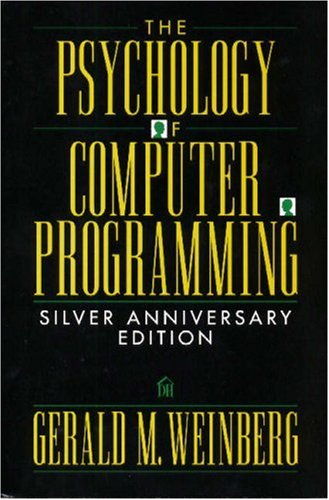Psychology of computer programming epub
Par walker stephen le dimanche, juin 26 2016, 10:17 - Lien permanent
Psychology of computer programming by Gerald M. Weinberg


Psychology of computer programming Gerald M. Weinberg ebook
Format: djvu
Publisher: Dorset House
ISBN: 0932633420, 9780932633422
Page: 299
This is just a quick quote from the course description of a ten year old course in Cognitive Psychology and Computer Programming at the Texas A&M: Computer. Reduction of computer fears was examined by comparing changes in computer attitudes over a semester among two introductory computer programming classes and one introductory psychology class (N=50). [Version 1.1 of this post, revised/extended on 05/22/2012]. Everyone ends up learning from their own mistakes and other people's mistakes.” – Jerry Weinberg, “The Psychology of Computer Programming”, 1971. However, the rules note that the skill should only exist in the more "cinematic" games — in a realistic game, the would-be hacker will have to instead learn a bunch of various skills like computer programming, psychology, etc. Historically, the practice of code reviews existed in methodologies like RUP as both informal code they will find errors. Psychology of Computer Programming By Gerald M. Weinberg Publisher: Van Nostr and Rein grasp Comp any 1971 | 288 Pages | ISBN: 0442292643 | DJVU | 2 MBLong regarded for example one of the f. Weinburg describes a style of development environment relying heavily on peer reviews. Egoless programming's roots lie in the book, “The Psychology of Computer Programming” by Jerry Weinburg, 1971. [The first of a planned series of posts on "Readings in Software Engineering"]. The Psychology of Computer Programming, Gerald M. As most software development teams know, frequent code reviews ensure the containment of poor code quality such as inefficiencies in unit-level design and lack of adherence to coding standards. This book has only one major purpose—to trigger the beginning of a new field of study: computer programming as a human activity, or in short, the psychology of computer programming. Researchers in Sweden have created a computer program that can score 150 on standard non-verbal IQ test questions by modeling human problem-solving psychology.